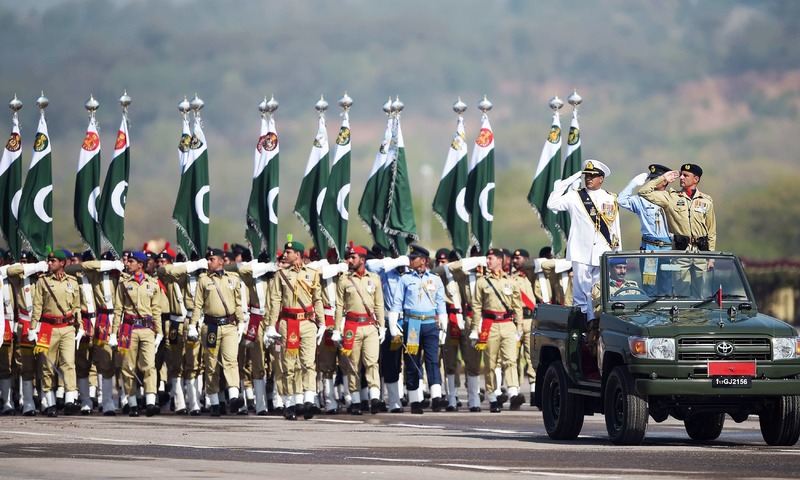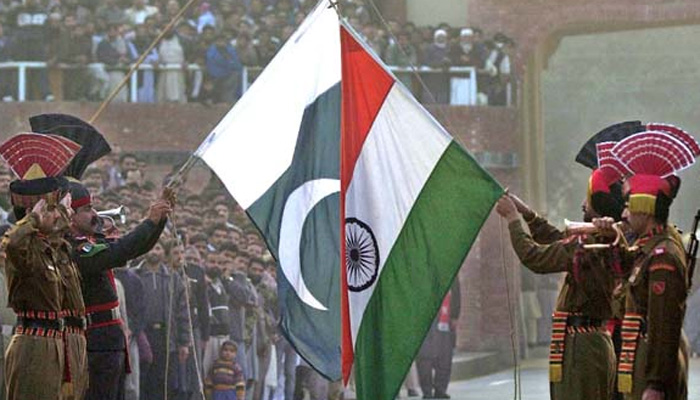Worthy Guests, Diplomats, Panelists, Participants, Ladies & Gentlemen!
Assalam-o-Alaikum & Good Afternoon!
It is my profound privilege and pleasure to address this august gathering of some of the best Pakistani and global minds. “Together for ideas” is a very appropriate theme chosen by the organizers for this dialogue. I am certain that the policy practitioners and scholars present here or participating virtually, will not only discuss Pakistan’s security vision but also formulate ideas to guide us on how best to tackle Pakistan’s future security challenges.
I would like to appreciate the National Security Division for identifying the need for Pakistan to have its own security dialogue. I commend the NSD and its Advisory Board for putting together the first iteration of this Dialogue. I hope this trend of integrating intellectual input into policy-making continues to grow.
Ladies and gentlemen, it is an almost universally acknowledged fact that the contemporary concept of national security is not only about protecting a country from internal and external threats but also providing a conducive environment in which aspirations of human security, national progress, and development could be realized. Surely, it is not solely a function of armed forces anymore. National security in the age of globalization, information, and connectivity has now become an all-encompassing notion; wherein, besides various elements of national power, global and regional environment also play a profound role.
National security is thus multi-layered: outer layers being the exogenous factors of the global and regional environment and inner layers being the endogenous factors of internal peace, stability, and developmental orientation. A nation at peace and a region in harmony are thus essential prerequisites for the attainment of national security in the true spirit. No national leaders of today can ignore these factors. I also firmly believe that no single nation in isolation can perceive and further its quest for security, as every single issue and security dilemma faced by today’s world is intimately linked with global and regional dynamics. Whether it be human security, extremism, human rights, environmental hazards, economic security, or pandemics, responding in silos is no longer an option.

Ladies and gentlemen! The world has seen the ravages of World Wars and the Cold War, wherein polarisation and neglect of virtues blighted the human future and brought catastrophic consequences for humanity. On the contrary, we have witnessed how multilateral rule-based platforms contributed to the good of mankind. Today we face similar choices; whether to stay etched in the acrimony and toxicity of the past, continue promoting conflict and get into another vicious cycle of war, disease, and destruction; or to move ahead, bring the dividends of our technological and scientific advancements to our people and usher in a new era of peace and prosperity.
We must not forget that the desire to achieve autarky was historically divisive and a stimulus for grabbing more, leading to “haves” and “have nots”. History has taught us that the way ahead has always been through an interconnected, interdependent, and collective sense of security,
Today the leading drivers of change in the world are demography. economy and technology. However, one issue which remains central to this concept is economic security and cooperation. Frayed relations between various power centers of the globe and boomeranging of competing alliances can bring nothing but another stint of the cold war. It is naive to apply the failed solutions of yesteryears to the challenges of today and tomorrow. It is important for the world that the leading global players must reach a stable equilibrium in their relations through convergences instead of divergence.
In this environment, developing countries like Pakistan, today face multi-dimensional challenges, which cannot be navigated single-handedly. A similar situation is confronted by other countries in our region as well, therefore, we all require a multilateral global and regional approach and cooperation to overcome these challenges.
Dear Participants! You are well aware that South Asia is home to one-quarter of the world’s population. However, despite tremendous human and resource potential, the unsettled disputes are dragging this region back to the swamp of poverty and underdevelopment. It is saddening to know that even today it is among the least integrated regions of the world in terms of trade, infrastructure, water, and energy cooperation.

On top of it, despite being one of the most impoverished regions of the world, we end up spending a lot of money on our defence, which naturally comes at the expense of human development. Pakistan has been one of the few countries, despite the rising security challenges has resisted the temptation of involving itself in an arms race. Our defence expenditures have rather reduced instead of increasing. This is not an easy undertaking especially when you live in a hostile and unstable neighbourhood. But, having said that, let me say profoundly that we are ready to improve our environment by resolving all our outstanding issues with our neighbours through dialogue in a dignified and peaceful manner.
However, it is important to state that, this choice is deliberate and based on rationality and not as a result of any pressure. It is our sincere desire to re-cast Pakistan’s image as a peace-loving nation and a useful member of the international community. Our leadership’s vision is Alhamdullilah transformational in this regard. We have learned from the past to evolve and are willing to move ahead towards a new future, however, all this is contingent upon reciprocity.
Ladies and gentlemen! The world knows that we are geo-strategically placed, to be a bridge between civilizations and connecting conduit between the regional economies. We are a nation of significance due to our large and enterprising demography, fertile soil, and adequate logistical infrastructure. We intend to leverage our vital geostrategic location for ours own, regional and global benefit. Our robust role in the current quest for peace in Afghanistan is proof of our goodwill and understanding of our global and moral obligations Our close collaboration and crucial support for the peace process has led to the historic agreement between the Taliban and the US and paved the way for intra-Afghan dialogue.
We will continue to emphasize a sustained and inclusive peace process for the betterment of the people of Afghanistan and regional peace. Moreover, besides offering our all-out support to the Afghanistan peace process, we have also undertaken unprecedented steps to enhance Afghanistan’s trade and connectivity by:
- Re-energising Afghan-Pakistan Transit Trade Agreement and also providing access to Afghanistan to export her goods to India
- Improving economic and trade environment along Pak-Afghan border by establishing border markets and development of infrastructure
- Being part of energy and trade corridors binding Central. South and West Asia through land routes and inviting Afghanistan to be part of CPEC.
Dear Participants! Stable Indo-Pak relation is a key to unlock the untapped potential of South and Central Asia by ensuring connectivity between East and West Asia. This potential, however, has forever remained hostage to disputes and issues between two nuclear neighbors. Kashmir dispute is obviously at the head of this problem. It is important to understand that without the resolution of the Kashmir dispute through peaceful means, the process of sub-continental rapprochement will always remain susceptible to derailment due to politically motivated bellicosity. However, we feel that it is time to bury the past and move forward. But for the resumption of the peace process or meaningful dialogue, our neighbor will have to create a conducive environment, particularly in Indian Occupied Kashmir.

Ladies and gentlemen, today we are a nation with tremendous geo-economic potential. In order to carve a promising future for our people, it is important for us to embark upon a solid economic roadmap, backed up by infrastructural developments and regional integration. Our choices with respect to the same have been clear and explicit. This geo-economic vision is centered around four core pillars:
- One: Moving towards a lasting and enduring peace within and outside
- Two: Non-interference of any kind in the internal affairs of our neighboring and regional countries
- Three: Boosting intra-regional trade and connectivity
- Four: Bringing sustainable development and prosperity through the establishment of investment and economic hubs within the region
Pakistan has been working towards all four aspects with the unity of purpose and synchronization within the various components of national security. We had realized that unless our own house is in order, nothing good could be expected from outside. Now, after having overpowered the menace of terrorism and tide of extremism, we have begun to work towards sustainable development and improving the economic conditions of under-developed areas. Pakistan Army has contributed tremendously towards this national cause by rebuilding and mainstreaming some of the most neglected areas through massive development drives besides ensuring peace and security. Our long campaign against the tide of terrorism and extremism manifests our resolve and national will. We have come a long way and yet we are a bit short of our final objective but we are determined to stay the course.
Dear participants! CPEC has been at the heart of our economic transformation plan and we have left no quarter to declare its necessity for addressing our economic woes. Our sincere efforts to make it inclusive, transparent, and attractive for all global and regional players, with the aim of bringing its benefits to everyone.
Let me also emphasize that while CPEC remains central to our vision, only seeing Pakistan through the CPEC prism is also misleading. Our immensely vital geostrategic location and a transformed vision make us a country of immense and diverse potential which can very positively contribute to regional development and prosperity.
This vision however remains incomplete without a stable and peaceful South Asia. Our efforts for reviving Saarc, therefore, are with the same purpose. Our efforts for peace in Afghanistan. responsible and mature behavior in a crisis situation with India manifest our desire to change the narrative of geo-political contestation into geo-economic integration.
While we are doing our bid, a major contribution is to be made by the global players through their cooperation. I am sure that an economically interconnected South Asia is much more suited to them instead of a war-torn, crisis-ridden, and destabilized region. We also see hope in the form of incoming US administration which can transform the traditional contestation into a gainful economic win-win for the world in general and the region, in particular, South Asia can be the starting point for regional cooperation. I have a firm belief that economic and sustainable human development can guide us into a future, full of peace and prosperity. And finally, it is time that we in South Asia create synergy through connectivity, peaceful co-existence, and resource sharing to fight hunger, illiteracy, and disease instead of fighting each other.
I thank you.


